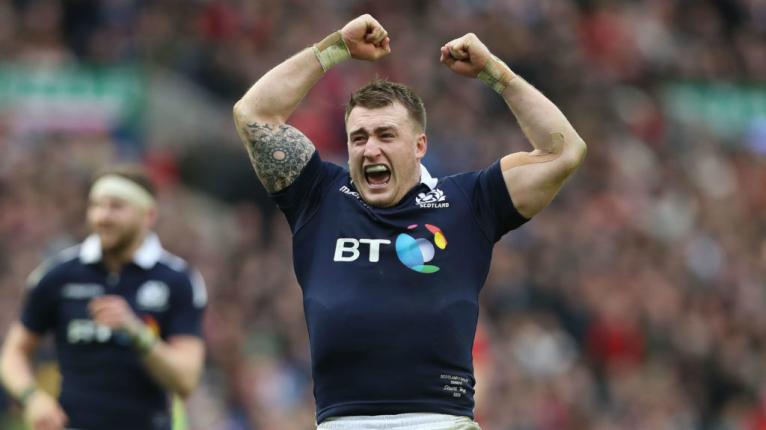It is hard to say which did better numbers on Monday’s news cycle: the election of Humza Yousaf as Scotland’s new First Minister, or the impending retirement of Stuart Hogg at what will be the startlingly young age of 31.
Hogg’s statement landed at lunchtime, just as SNP ballots were being counted, ironically, at Murrayfield Stadium. It sparked a thermonuclear reaction online. Shock, mostly. Astonishment, certainly. There is almost an air of grief, too, for rugby followers have scarcely known a Scotland team bereft of Hogg since he exploded on to the international scene over a decade ago.
To anyone who has listened to Hogg over the past year, though, this has not come as a revelation. The Scotland captaincy weighed heavily upon his shoulders, largely because of his sheer desire to do the role and the country justice. That culminated in the petulant post-match press conference after another Scottish loss at the Aviva. The jibes about his hair and his teeth became so wounding that he felt compelled to publish an blistering Instagram story to bite back at them. The pressures of the game and the people around it grew and grew again. In a BT Sport interview during October, he spoke with stark candour about how close he had come to walking away altogether. It was the kind of rhetoric that made you think we’d better enjoy him while we can.
The impish toss of the ball to a prone Englishman who had lunged towards Hogg as he skated in. It was the young Hogg in microcosm: daring, gallus, and utterly captivating.
And pressure on Hogg has never truly relented. That is the price of greatness. It began 11 years ago, a thunderous breakthrough moment far from the spotlight soon proliferating across the internet in the days before words like ‘viral’ were commonplace. It’s still available on YouTube, Hogg’s slaloming, mesmerising glory run against England Saxons in Galashiels. A high-ball receipt inside his own half, a deadly change of pace, a stuttering, shimmying gait leaving white-shirted defenders tangled like giraffes on an ice rink. The impish toss of the ball to a prone Englishman who had lunged towards Hogg as he skated in. It was the young Hogg in microcosm: daring, gallus, and utterly captivating.

At 19 years-old, he was saddled with the hopes of a rugby nation. He never played for Scotland A again, elevated not only into the senior squad but into the matchday 23. He made his debut off the bench against Wales and had a try wrongly disallowed. He seared home to score on his first start against France in the next round of the Six Nations. Scotland, in those days, were cumbersome and profligate and painfully try-shy. This brilliant teenage Borderer became a poster boy almost overnight. For a time, he carried the Scottish attack. A year later, he was a Lion.
Inevitably, some of that status went to his head. Hogg, by his own admission, allowed his ego to overinflate. He sought a move from Glasgow, where he had been pulling up trees by the week. He agitated to join Ulster and Gregor Townsend left him out of the Warriors squad for the 2014 Pro12 final, which Glasgow lost to Leinster.
That was about the last we saw of Hogg’s immaturity. Fatherhood, when it came, changed him as it changes all men. The pressure remained, but Hogg got better at coping with it. He learned that to flourish at the top, he could not saddle himself with the duty to pluck rabbits from hats with every carry. Test rugby doesn’t work that way.
His name belongs with those of Ken Scotland, Andy Irvine, Gavin Hastings and Chris Paterson in the pantheon of elite Scotland full-backs. In the professional era, he is the finest Scot of all.
Run the gamut of Hogg’s career stats, and there’s a list of benchmarks and laurels and achievements long enough to bridge the Clyde. He propelled Glasgow to the Pro12 title in 2015, the first, and only, major honour a Scottish club has ever claimed. He was the first Scot to be named Six Nations player of the year in 2016 and the second man to earn that honour in successive seasons. He has only the iconic Brian O’Driscoll for company in that club.
Hogg became the youngest Scot to reach 50 caps, then a Lion again in 2017. He would have been a Test starter but for a freak collision with Conor Murray which ended his tour and nearly cost him the sight in one eye.

He went to Exeter in 2019 and in his first campaign at Sandy Park, helped the Chiefs win the European and Premiership double. He toured with the Lions for the third time in 2021 and at last, realised his deep-rooted longing to represent the tourists in a Test match. Then he broke his country’s try-scoring record, which had stood unshattered since 1933, and, a few weeks ago at Murrayfield, became the fourth Scotsman to breach 100 caps and the youngest to do so.
Opta put out some eye-catching stats on Monday afternoon. Since his Six Nations debut, Hogg has beaten more defenders and gained over 1000 more metres than any other player. Only O’Driscoll, again, has evaded more tacklers in the Six Nations era.
He has been part of teams to smash hoodoos at Twickenham, in Paris and in Wales. He has won three Calcutta Cups. He has played the most influential role of any of the players to have changed Scotland’s narrative, hauling them out of the doldrums they inhabited for so much of this century. His name belongs with those of Ken Scotland, Andy Irvine, Gavin Hastings and Chris Paterson in the pantheon of elite Scotland full-backs. In the professional era, he is the finest Scot of all. A generational talent whose CV, consistency and unmitigated wow factor stacks up against the best.
Rugby is not ubiquitously popular in Scotland but if you grabbed 100 people off Buchanan Street and asked them to name a member of the national team, Hogg’s would be the first on many, many lips.
Bizarrely enough in the face of this evidence, Hogg still has his detractors. People who think the hype outweighs the quality. Unfair perceptions about his persona. He has not always handled himself with unblemished decorum. But what modern-day sportsperson has? He was not an iron defender like Leigh Halfpenny, or a colossus in the air like Israel Folau. He made errors – and high-profile ones – particularly against Ireland. But so did his best predecessors. Andy Irvine was famously booed at Murrayfield after a wayward half off the kicking tee, before taking France to pieces single-handedly in the second 40. Gavin Hastings missed a simple goal during the 1991 World Cup semi-final loss to England.
On this matter, it is instructive to listen to the rugby minds who know best. Townsend has always talked up Hogg as a world-class operator but you’d expect his own coach to say those things. You wouldn’t expect such praise from a rival. A few years ago, at the annual pre-Six Nations jamboree, Gatland was asked by the BBC to choose any player from an opposing squad to play for his team. He went for Hogg. At his peak, Hogg was the best full-back in world rugby.
But the game takes a heavy toll, even on its talismans. Hogg says his body can no longer give him what he wants. The scorching line-breaks have become less frequent. You get the sense his brain has grown weary of the myriad strains too.
Rugby is not ubiquitously popular in Scotland but if you grabbed 100 people off Buchanan Street and asked them to name a member of the national team, Hogg’s would be the first on many, many lips.

He has defined an entire era of Scottish rugby, a time when Glasgow grew into a force, when Scotland became a serious, dangerous nation again after so many barren years. He has confronted his vulnerabilities off the pitch as he attacked kick-chasers and gainlines on it.
He will not fizzle out with a slow, waning flame deep into his thirties, but bow out at the top, at the World Cup, near the height of his powers. He will exit from the grandest stage of all. He retires young, but retires a giant. The fervent hope is that Scotland’s performance gives him a fitting denouement.



Didn't he pretend he scored a try when the ball slipped out of his hand whilst he was showboating? 'Honest'?
Hogg was a legend. Oh and an outstanding rugby footballer as well. Enjoy retirement mate!